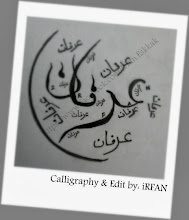Al-Isra Wal-Mi’raj – Part II
Following
the ‘Year of Sorrow’,which was a dark time for the
Muslims, and three weeks after the incident at Ta’if, Prophet
Muhammad (SAW) experienced the Isra and the Mi’raj. This journey begun
around the 10th year after revelation and approximately three years before the
Prophet’s (SAW) migration from Makkah to Medina, known as the Hijrah. It was a
journey that began at the Ka’bah in Makkah, to Masjid Al-Aqsa in Jerusalem, and
concluded in the Heavens. Al-Isra Wal-Mi’raj was one of the most
miraculous experiences that Allah (SWT) had bestowed upon Prophet Muhammad
(SAW). This journey has no parallel in human history, and concludes beyond the
horizons of human comprehension. The Quran says:
“Glorified
is He Who carried His servant for a journey by night from the Holy Mosque (in
Makka) to the farther Mosque (in Jerusalem) – whose surroundings We have
blessed – that We might show him some of Our signs. Indeed He alone is
All-Hearing, All-Seeing.”
(Sura Al-Isra 17:1)
The
first part of Prophet Muhammad’s (SAW) journey all began, one special night, a
long time ago, when three Angels, sent by Allah (SWT), came to the Prophet
(SAW) while he slept near the Ka’bah. The Angels Jibreel, Mika’il and Israfeel
awoke the Prophet (SAW) from his slumber, and carried him to lay on his back by
the the spring of Zamzam. Angel Jibreel then split open the Prophet’s (SAW)
chest from his throat to his middle, and said to Mika’il, “Bring me a tast (a vessel, usually made of copper) of water from
Zamzam so that I will purify his heart and expand his breast.”Angel
Jibreel took out the Prophet’s (SAW) heart and washed it three times with the
pure waters, removing from it what was wrong. Mika’il went back and forth to
Jibreel with the vessel of water from Zamzam three times. Then Mika’il brought
Jibreel a golden vessel filled with wisdom and belief which Jibreel emptied
into the Prophet’s (SAW) chest. They filled the Prophet’s (SAW) chest with hilm
(intelligence, patience, good character), knowledge, certainty, and submission,
then Jibreel closed his chest and sealed it between his shoulders with the Seal of Prophethood.
Prophet
Muhammad (SAW) was then presented with Buraq (lightening mount). This steed,
was created specifically for this momentous occasion- to carry the noble
Prophet from Makkah to Jerusalem. Buraq had white wings on either side of its
thighs that made him seem stronger when he stepped. Buraq was
handsome-faced and bridled, a tall, white, wide beast, ”whose each stride stretched as far as the eye could see”, and had phenomenal speed that could cover a long
distance in a short span of time. “I was then presented with a beautiful Buraq. This is an
animal larger than a donkey but smaller than a mule. I mounted it.” (Sahih
Muslim). When Angel Jibreel asked Buraq why it was so
jumpy and anxious, it replied,“Amongst
all steeds created light years ago, I was created for this most honourable
occasion- to carry the Beloved of God The Supreme, The Exalted!” When
the Prophet (SAW) mounted Buraq with Jibreel, they traveled and passed many
different places and experienced some strange and wondrous things along the
way, until they reached the city of Jerusalem.
Upon
arrival at the Farthest Mosque in Jerusalem, the Prophet (SAW) dismounted
Buraq, and entering Masjid Al-Aqsa, the Prophet (SAW) found himself in the
midst of the most honorable gathering. Every Prophet and Messenger
from Adam (AS) to Isa(AS), was present and awaiting his arrival to pray two
rakaats. Angel Jibreel then asked the Prophet Muhammad (SAW), to lead all the
Prophets and Messengers in prayer as the Final Messenger of Allah (SWT). Upon
completion of the prayer, the Prophet (SAW) was then presented with a vessel of
wine and a vessel of milk. “On
the night Allah’s Apostle was taken on a night journey (Miraj) two cups, one
containing wine and the other milk, were presented to him at Jerusalem. He
looked at it and took the cup of milk. Gabriel said, “Praise be to Allah Who
guided you to Al-Fitra (the right path); if you had taken (the cup of) wine,
your nation would have gone astray.” (Narrated by Abu Huraira. Bukhari
7:69:482).
This noble assembly marked the end of
the horizontal part of the Prophet’s (SAW) journey, Al-Isra. From
here, accompanied by Angel Jibreel, the Messenger (SAW) ascended on a
beautiful ladder that led toward the heavens, and thus began the second part of
his vertical journey, the Mi’raj
-
End of Part 2 (Al-Isra Wal-Mi’raj)
















